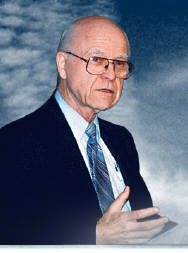Gutenberg and the
Eclipse of Islam
Across Pacific Magazine
Across Pacific Magazine
  News - God at Work - Humour - Heroes - Back Articles - Across Home Gutenberg
and the Eclipse of Islam
Ralph D. Winter (first shared on Friday
October 10, 2003)
 In Morocco a three-year-old boy accidentally gashed the forehead of a playmate with a steel toy. Both were missionary kids. One missionary family was visiting another. A Moroccan family was also present. Immediately the missionary mother of the offending boy rushed to apologize, and asked the boy who did the harm to apologize. The other mother asked her boy to forgive. Later, the Moroccan family expressed total amazement. They said that if that had happened in their own society the two families would have never talked again. Why the great difference? In the early 1500s, when Luther was a leader, Muslims in the world were as numerous as Christians (despite a 600-year late start). Today they are only half the number of Christians. Paradoxically, in Luther's day Muslims were way ahead of "Christian Europe" in almost every intellectual, political and military endeavor. For one reason they had inherited the riches of the Roman Empire of which Northern Europe shared only a much smaller part and mainly late. What in the world, then, happened around 1500 that began to accelerate things for Christians? Modern Europe from that time greatly accelerated in its rise from tribalism. By contrast, the intellectually and educationally superior Islam made little if any similarly spectacular progress.
This question highlights one of the major enduring mysteries for citizens of the world today. Most Western historians do not wish to be accused of an ethno-centrism which would exaggerate their own cultural tradition. However, the whole world is looking on and for everyone it is a mystery. In the West we may lean over backwards to keep from thinking that our world is inherently superior. We brood over the Western man of world wars and holocaust. Others around the world, however, may more often wonder how the West achieved its greatness (and weaknesses). They can plainly see relative superiority on practically every front: educational, technical, economic, political freedoms, human rights, medical care, emancipation of women, care for the environment etc...Doesn't much of the non-Western world want to migrate to the West if it only could? The mystery then definitely deepens when we realize the fact that this curious and apparent Western superiority (which is now giving away its science and technology to the whole world, and is leading the world in virtue as well as horrendous vice), represents a fairly recent and rather sudden change, speaking historically. Unfortunately my own thinking expressed here about the enigma of the sudden rise of the West will in many secular circles today seem biased, simplistic, or even unthinkable. But stop and think. By Luther's day there were a quarter of a million printed documents thanks to Gutenberg, and seventy-five percent of them were religious. Beginning in 1450 with the introduction of the moveable type into Europe, Europe became gradually flooded with printed material, and in those days there was a handy lingua franca which allowed thinkers in any part of Europe (and even as late as the 18th century in America) to use Latin as a universal language. Why didn't Islam gain from moveable type? For one thing, because Arabic script does not easily lend itself to discrete characters, they flow together. But, an even greater factor is that they did not have the Bible. Had they had it they would have been assiduously copying it by hand as in Europe. Thus, in my view it was, finally, the Bible itself which was the prime mover. Even if they could have printed the Quran with moveable type for every man, it is a mish-mash of confusion by comparison to the Bible. The Bible was what underlay Luther's concept of sola scriptura, the adoption of Biblical authority over the Papal pronouncements. It became a tangible touch-stone for guidance by the living God outranking all human authorities. It portrayed concepts of love, forgiveness and meekness which radically challenge unredeemed society. It was, in effect, the pregnant disturbance that formed the radically new modern West with all of its rare and genuine virtues as well as allowing and tolerating hostile rejection of the divine. It is the rejection of the Bible today that has resulted in fragmented families, emotionally handicapped children, morally corrupt business and political leaders. It would seem clear that the only way to prevent the West from slipping into a new dark age is to re-introduce it to the Bible. That is what makes Vishal Mangalwadi's Book of the Millennium project to take the Bible to the heart of our cultural stream on PBS is extremely relevant. May that public television series soon emerge! Meanwhile, we do well to realize that there is something very profound that has changed in our own cultural stream as the result of the Bible. |
|